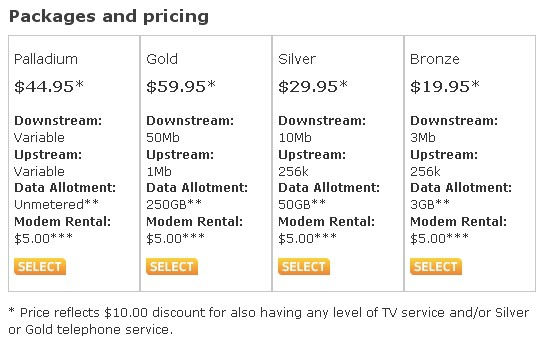Shaw Cable, western Canada’s largest cable company, has quietly lowered usage caps on virtually all of their broadband plans, while “forgetting” to change the date on their Terms of Service:
- Lite was 13GB, now increased to 15GB ($2/GB overages)
- High Speed was 75GB, now decreased to 60GB ($2/GB overages)
- Xtreme was 125GB, now decreased to 100GB ($1/GB overages)
- Warp was 250GB, now decreased to 175GB ($1/GB overages)
- Nitro was 500GB, now decreased to 350GB ($1/GB overages)
Shaw’s terms of service page documents changes implemented by the cable company and includes the revision date, changed whenever the terms change. Not this time. Blogger “Thewunderbar” documented Shaw left the revision date on the document unchanged, suggesting the cable company hadn’t made any adjustments to their service since July, 2010. After publishing his piece, Shaw quietly updated their website to reflect the correct date.
Cable and phone companies in Canada have established a unique, unchecked duopoly. They are systematically increasing prices while decreasing the amount of service provided to Canadian consumers. Shaw’s decrease in usage limits comes with no corresponding price cut for Internet service.
At a time when Netflix streaming is attempting to make inroads into Canadian homes, broadband providers who also have interests in pay television (cable, phone or satellite) are working overtime to make sure no consumer believes they can safely cancel their cable-TV service and watch everything online.
Over the past four years, Canadian ISPs have embarked on a wide range of Internet Overcharging schemes:
- The elimination of flat rate, unlimited broadband service;
- The introduction of low usage allowances designed to trip up an increasing number of consumers leading to,
- The introduction of stinging overlimit fees for customers exceeding usage limits, at prices marked up from 500-5000 percent above wholesale;
- The introduction of speed throttles which artificially slow your broadband experience to speeds sometimes just above dial-up;
- The ongoing limbo dance of usage caps that decrease in size over time, exposing more consumers to overlimit fees, making them think twice about everything they do online.
![]() Nobody has successfully monetized the broadband experience like Canadian ISPs have. Even as their costs to deliver the service continue to rocket downwards, companies keep on increasing prices, exposing Canadian consumers to unwarranted bill shock from unjustified overlimit fees. What does it cost Shaw per gigabyte? An estimated 1-3 cents. What do they charge you? Up to $2.
Nobody has successfully monetized the broadband experience like Canadian ISPs have. Even as their costs to deliver the service continue to rocket downwards, companies keep on increasing prices, exposing Canadian consumers to unwarranted bill shock from unjustified overlimit fees. What does it cost Shaw per gigabyte? An estimated 1-3 cents. What do they charge you? Up to $2.
It’s nothing short of a rip-off, and Stop the Cap! urges Canadian consumers to contact their member of Parliament and demand immediate action to ban these innovation-killing, job-retarding, unjustified overcharging schemes.


 Subscribe
Subscribe










